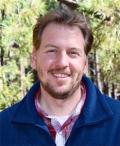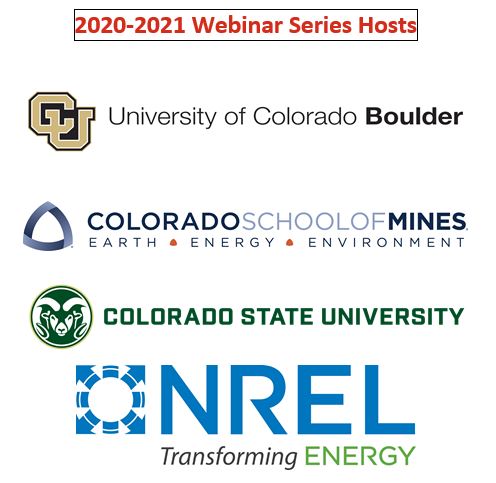Webinar description Agrivoltaics are the synergistic combination of solar photovoltaic power plants with agricultural uses, such as crop production and grazing. In addition to providing improvements to agricultural and energy production, agrivoltaics help reduce water consumption and improve soil health. Agrivoltaic farms are literal representations of the food, water, energy nexus. While agrivoltaics have been adopted much more widely in Europe and Japan, researchers and practitioners in the US are exploring ways to leverage the benefits of this practice and increase deployment.
Key takeaways: An understanding of agrivoltaic applications and their benefits, as well as the barriers facing farmers and developers in deploying agrivoltaic practices in
Objective: Educate attendees about benefits of agrivoltaics and next steps to remove barriers to adoption and increase deployment
Audience: Policy makers, energy developers, agricultural community, research community
Original air date: September 22, 2021
Cost: Free of charge but everyone must register using this link.
Click here to view the webinar recording.
Co-Hosts:
Colorado Energy Research Collaboratory (An energy research partnership since 2007 between University of Colorado Boulder, Colorado School of Mines, Colorado State University, and National Renewable Energy Lab)
Colorado Agrivoltaic Learning Center (CALC)
Colorado Renewable Energy Society (CRES)
Colorado Solar & Storage Association (COSSA)
Webinar host and for more info: Maury Dobbie, Executive Director, Colorado Energy Research Collaboratory
970-682-5707 (cell/text) [email protected]
Moderator: Jordan Macknick, Lead Energy-Water-Land Analyst, National Renewable Energy Laboratory (NREL) Jordan Macknick PPT slide deck
Panelists:
Greg Barron-Gafford, Associate Professor, Biogeography & Ecosystem Science, University of Arizona Greg Barron-Gafford PPT slide deck
Jennifer Bousselot, Assistant Professor, Assistant Professor, Dept. of Horticulture & Landscape Architecture, Colorado State University Jennifer Bousselot PPT slide deck
Alan Knapp, Professor of Biology, Colorado State University Alan Knapp PPT slide deck
Byron Kominek, Executive Director, Colorado Agrivoltaic Research Center (CALC) Event: Saturday Sept 25 (5:30-9:00pm MST) at the Colorado Agrivoltaic Learning Center. Click here for more information about the event. Byron Kominek PPT slide deck
**************************************BIOS************************************
 Jordan Macknick
Jordan Macknick
Lead Energy-Water-Land Analyst
National Renewable Energy Lab
Jordan Macknick is the Lead Energy-Water-Land Analyst for NREL. He is a member of the Strategic Energy Analysis Center’s Systems Modeling team within the Resources and Sustainability Group. His primary work addresses the environmental impacts of energy technologies, while seeking opportunities for energy and ecological synergies. In his energy-water-land leadership capacity, Macknick analyzes national and regional implications of different energy pathways in the context of water and land resources, evaluates opportunities to improve the energy management of water infrastructure, and explores innovative approaches to co-locating solar and agricultural activities. His areas of expertise include Systems modeling of energy and water infrastructure interactions; Renewable-powered water treatment systems; Meta-analysis of diverse data sets; Low-impact renewable energy development. His research interests include Interface of energy, water, and land issues in policy planning; Co-location of agriculture and solar technologies; Energy services of water infrastructure; Water management in unconventional oil and gas operations. His education degrees are M.E.Sc. in Transboundary Natural Resource Policy, Yale University and B.A. in Mathematics and Environmental Studies, Hamline University. His prior work experience includes Research Associate, International Institute of Applied Systems Analysis (IIASA); Research Assistant, School of Forestry and Environmental Studies, Yale University; Community Wind Specialist Intern, Windustry; Assistant Managing Director, EcoFacilitation Ltd. [email protected]
 Jennifer Bousselot
Jennifer Bousselot
Assistant Professor, Dept. of Horticulture & Landscape Architecture
Colorado State University
Jennifer Bousselot, Ph.D., is an Assistant Professor in the Department of Horticulture and Landscape Architecture at Colorado State University (CSU) in the College of Agricultural Sciences. She specializes in green roof research on native species evaluations, plant drought tolerance, integration with solar panels, and rooftop agrivoltaics. Jen is the Editor of the Journal of Living Architecture, a longtime member of the Research Committee for Green Roofs for Healthy Cities (GRHC), and Board Member of both GRHC and the High Plains Environmental Center in Loveland, Colorado. Jen is an accredited Green Roof Professional and co-coordinates the Colorado Regional Center for Excellence in Living Architecture, both designated by GRHC. She was a technical advisor for the 2017 Green Roof Ordinance in Denver and is on the Green Building Ordinance Technical Advisory Committee for the City of Denver. Due to her expertise in green roofing, Jen regularly consults on the design, installation, and maintenance of green roofs. Jen has co-authored over 20 peer reviewed publications since 2010 with most related to green roofs, local foods, and native plants. Jen has co-authored a book called Common Southwestern Native Plants, contributed to two chapters in the book Ecoregional Green Roofs, and will be releasing Trees and Shrubs of Colorado next year. [email protected]
Byron Kominek
Executive Director
Colorado Agrivoltaic Learning Center
Byron has worked in international development for well over a decade, having lived in various parts of Africa for over 6 years. He brings to the Colorado Agrivoltaic Learning Center his development skills of seeking constructive partnerships and his desire to improve both environmental and community well-being within the scope of a single project. Byron is a former U.S. diplomat and a Returned Peace Corps Volunteer. He has a M.Sc. in Environmental Engineering and speaks French and Portuguese. [email protected]
Alan Knapp
Professor, Biology in College of Natural Sciences
Colorado State University
Professor Knapp was named University Distinguished Professor twice. He is one of the world’s most-respected ecosystems ecologists and has compiled a noteworthy career in teaching and research that stretches more than 35 years. The lab’s current research spans ecological scales, with spatially- and temporally-broad studies complemented by mechanistic ecophysiological investigations. Current interests include: global change ecology, especially manipulations of precipitation extremes (droughts and deluges), and large-scale comparisons of ecosystem sensitivity to climate, fire, grazing, and nutrients. Most of our research is conducted in grasslands, which are ecologically and economically important systems that respond rapidly to change and are amenable to field manipulations. Collaborative, interdisciplinary research is appealing and important to us because it provides scientists the opportunity to make key contributions within the specific framework of a single discipline (a traditional approach), as well as the tools to synthesize across disciplines and tackle issues that the single lab approach cannot. This synthetic approach to Ecology will become more important in the future, and it best describes our group’s current and future research interests. Dr. Knapp earned his Ph.D. from University of Wyoming. [email protected]
 Greg Barron-Gafford
Greg Barron-Gafford
Associate Professor, School of Geography, Development & Environment
Associate Director, Community & School Garden Program
University of Arizona
Greg is a Biogeographer, which means his science sits at that exciting nexus of understanding how external forces (like environmental and human factors) and internal characteristics (like leaf biochemistry and plant functional type) act as determinants of where species can live and thrive. The Barron-Gafford research group studies the interactive effects of vegetation and climate change on plant & ecosystem function to inform forecasting and decision makers. They tackle questions related to fields of Biogeography, Plant Ecophysiology, Ecosystem Ecology, Ecohydrology, and Critical Zone Science. They study how semiarid plants and ecosystems respond to threats from drought, climate change, and human pressures like over grazing or clearing for renewable energy production. For the last 8 years, Greg has been building the field of ‘agrivoltaics’ - the concept of colocating agriculture and photovoltaics (renewable energy from solar panels). He began this work in southern Arizona to study the benefits across the food-energy-water nexus, and over the years have developed a national and international program connecting with researchers in Colorado and Oregon (USA), and in Africa and the Middle East. Helping develop science-based solutions to help people adapt to the increasing pressures that come from a changing climate is a personal and professional goal for Greg. [email protected]





